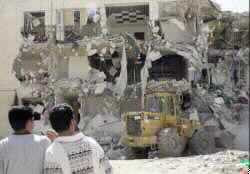Palestinian Reformers Nix PM Idea
02/10/2002| IslamWeb
 Bringing reform efforts to a temporary halt, Yasser Arafat's Fatah faction abandoned the idea of prodding the Palestinian leader to relinquish some power by appointing a prime minister, officials said Wednesday. The Fatah campaign had been the most serious political challenge to Arafat in years. It was cut short by Israel's 10-day siege of Arafat's compound which ended earlier this week, under intense U.S. pressure and following a U.N. Security Council resolution calling for Israel's withdrawal from Palestinian cities.
Bringing reform efforts to a temporary halt, Yasser Arafat's Fatah faction abandoned the idea of prodding the Palestinian leader to relinquish some power by appointing a prime minister, officials said Wednesday. The Fatah campaign had been the most serious political challenge to Arafat in years. It was cut short by Israel's 10-day siege of Arafat's compound which ended earlier this week, under intense U.S. pressure and following a U.N. Security Council resolution calling for Israel's withdrawal from Palestinian cities.
Arafat, meanwhile, described as a "catastrophe" U.S. legislation signed by President Bush that encourages recognition of Jerusalem as Israel's capital. "I am asking the American administration and the American president to stop this," Arafat told reporters at his largely demolished compound.
In other developments, Israeli explosives experts defused a pipe bomb at a gas station in the northern Israeli town of Afula. In the West Bank village of Tamoun, Israeli occupation troops blew up the two-story home of an activist in the resistance man Islamic Jihad group who was responsible for a deadly shooting attack on a Jewish settlement. Fifteen people were made homeless in the demolition, witnesses said.
Also Wednesday, Israeli officials shrugged off an admonition by British Prime Minister Tony Blair that U.N. resolutions have to be respected, whether they apply to Iraq or the Israeli-Palestinian conflict.
Palestinians have long complained about Israel's noncompliance with resolutions calling on it to withdraw from land it occupied in the 1967 Mideast war.
Addressing a conference of his Labor Party, Blair expressed support for the creation of a Palestinian state "based on the boundaries of 1967."
Responding to Blair, Israeli Defense Minister Binyamin Ben-Eliezer said Wednesday that Palestinian statehood is inevitable, but that only negotiations will lead to its creation. "No amount of international pressure will bring about the formation of a Palestinian state," Ben-Eliezer said.
Palestinian Cabinet minister Saeb Erekat said Blair's call was too vague. "I think it's good for Prime Minister Blair to say that even Israel needs to implement Security Council resolutions," Erekat said. "What we need to see from Mr. Blair is to specify the mechanism and timeline (for an Israeli withdrawal)."
Last week, the U.N. Security Council demanded that Israel end its siege of Arafat's headquarters and withdraw occupation troops from Palestinian cities. Soldiers pulled out of the Ramallah complex on Sunday, but stayed in town.
Since then, occupation troops have taken over two eight-story buildings overlooking Arafat's compound. Occupation troops also set up position at the gate, monitoring those entering and leaving.
Arafat complained Wednesday that the pullback was incomplete, and that soldiers were still patrolling nearby. His adviser, Nabil Abu Rdeneh, soldiers had their weapons trained at those inside the compound and that Israel is "trying to avoid the U.N. resolution rather than implement directly."
A group of Palestinian artists on Wednesday began painting a mural on one side of Arafat's office building, using the colors of the Palestinian flag - black, red, green and white. "We will build our house," read a slogan under the mural.
Ben-Eliezer said the siege was continuing from a distance "to allow a certain amount of inspection so that Israel can put its hands on all those inside who are suspects if they try to come out."
Late Tuesday, Fatah's Central Committee met with Arafat to discuss internal reform efforts. Before the siege, Fatah had been pushing for the appointment of a prime minister who would run the day-to-day affairs of government in what was seen as the strongest challenge to Arafat's autocratic rule in years.
Palestinian Planning Minister Nabil Shaath, a senior Fatah member, said Wednesday that the issue of naming a prime minister was raised by one of those present, but then dropped.
"The consensus of the members is that the prime minister should be appointed after the establishment of a Palestinian state and drafting a constitution," Shaath said.
Arafat confirmed Wednesday that he has asked for an additional three weeks for appointing a new Cabinet. On Sept. 12, as part of the brewing rebellion against him, the Palestinian legislature forced his Cabinet to resign, amid complaints of mismanagement and corruption.
Two major backers of the reform campaign were absent from the meeting. Mahmoud Abbas, who had been Fatah's candidate for prime minister, was abroad, while Palestinian Cabinet Speaker Ahmed Qureia cited prior engagements.
Critics of Israel's siege, including U.S. officials, warned repeatedly that the operation would harm Palestinian reform efforts and strengthen Arafat.
PHOTO CAPTION
Two Palestinian men inspect damaged buildings as a Palestinian bulldozer works to clear rubble in the Palestinian leader Yasser Arafat's compound in the West Bank town of Ramallah Tuesday, Oct. 1, 2002. Israeli occupation forces halted the siege of Arafat's headquarters but still have occupation forces in the area. (AP Photo/Nasser Nasser)
www.islamweb.net
